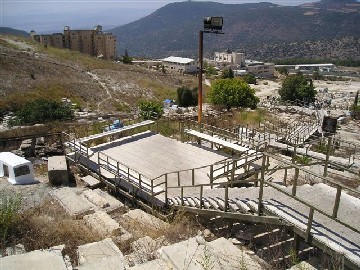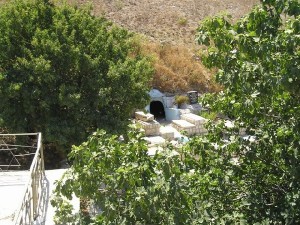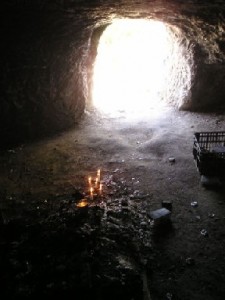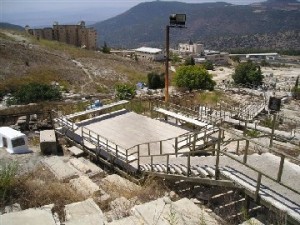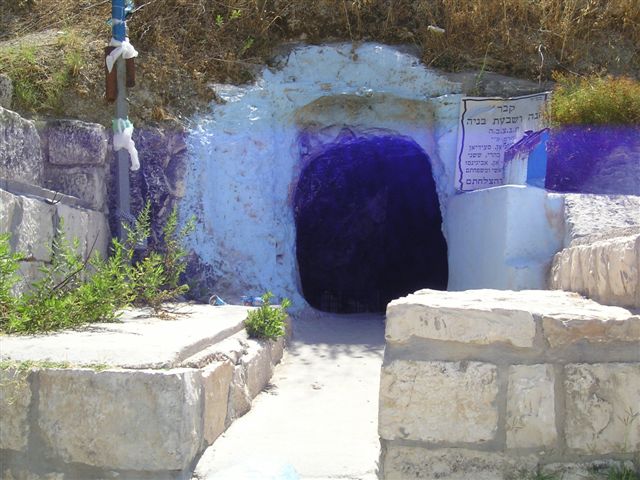“INNER LIGHTS OF CHANUKAH”
by Chana Katz
As we walk down the hillside of Tsfat’s historic Old Cemetery, we approach a mother who is buried along with her seven sons. For some, it may be viewed as one of the greatest stories of martrydom in Jewish history, perhaps even greater than the famous “Akeida” in which our forefather Avraham was all set to sacrifice his only son, Issac.
At least that’s the way Chana felt, because as the cruel gentile king ordered the death of her final and youngest son, she requested permission to give him one last mother’s kiss. Granted this permission, she embraced her son and whispered in his ear instructions to be carried out after his soul left his body: “Go to Avraham Avinu,” she said, “and tell him he was told to offer one son — I’ve offered seven sons.”
It’s no light story to ponder the pain this mother felt as one by one, her sons refused to bow down as the king demanded, each coming up with his own verse from the Torah to explain why it was more important to sacrifice the mortal body rather than harm the soul’s essential, eternal connection to its source.
But something here was more powerful than pain. It was the unfathomable level of happiness this mother felt when her children, on their own strength and desire, were willing to give up their very lives in order to cleave to G-d.
Perhaps that is why, after the last of her seven sons was tortuously killed, she went to the roof and jumped to her own death, and, as the story is related in the Gemara, a heavenly voice called out that she’s an “Eim Simaicha” (a joyful mother).
Still, it’s a hard story to grasp. And in her final resting place — a burial cave under the side of a mountain sprouting sporadic strands of tall grass and gentle wildflowers — hundreds, perhaps thousands of candles have been burned by the numerous visitors over the years, the hot wax having solidified into whitish-gray teary streams on the stone burial mound.
A KABBALISTIC EXPLANATION
So how does one actually prepare for a visit to the grave of Chana and her Seven Sons? For the English-speaker, a good place to start is at the Ascent library just minutes down the road from the Old Cemetery on HaAri Street. There, English-Hebrew editions of the Gemara help translate the straight text of Chana’s story.
But just reading the text might still leave one wondering how the mother could have watched each of her sons meet such a terrible death and not scream out for them to forget their wishes for self-sacrifice and just go ahead and bow down in idol worship, which, according to Jewish law, is one of the reasons to sacrifice one’s life.
A beautiful and deep interpretation of Chana’s story by Rabbi Yitzchak Ginsburgh is on an English cassette tape at the Ascent library with all the audio equipment there for one’s perusal.
In fact, if one never looked at Chanukah in another vein besides the miracle of the oil and the brave battle of Judah the Maccabee, this tape will draw a direct connection between Chana and Chanu-kah! Ginsburgh goes as far as to say that perhaps the story of Chana and her sons who refused to bow to Antiochus is the very basis of this weeklong celebration of one of the Jewish people’s greatest victories and why the last day of Chanukah, known as “Zot Chanukah” uses the feminine word “Zot.” Each candle, Ginsburgh says, serves as the “ner neshama” for Chana and her seven sons.
SEVEN TIMES NO, A THOUSAND TIMES NO!
According to the Gemara volume “Gittin”, the king asked each son to bow down to an idol. Each son, starting from the oldest to eventually the youngest, refused, each quoting a different passage from the Torah.
The first son quoted the first commandment, “How can I bow down?” he asked, “when it says in the Torah, “I am the L-rd your G-d.’ ”
The second son stated the commandment: “You shall have no other gods beside Me.”
Said the third: “How can I? Whoever sacrifices to a foreign god will be wiped out of the Jewish people.”
Quoted the fourth son: “You shall not bow down to other gods.”
The fifth son quoted the “Shma” — “Hear O Israel, the L-rd G-d, the L-rd is One.”
The sixth son explained: “You shall teach today your heart that Hashem is the only G-d in the heavens and earth and there is no other.”
Finally, the merciless king turned to the seventh and youngest son who quoted the longest passage: “We have sworn to Hashem not to change Him for any other god and G-d has sworn to us not to exchange us for any other people.”
The king was taken aback. This boy was the youngest, yet the most clever — and also willing to give his life. Nonetheless, the king tried to deceive him: “I’ll throw my ring down,” he said, “and so people won’t ridicule me it will look like you’re bowing down but really you’ll only be picking up the ring.”
No luck, Antiochus. The brave lad said, “If your honor as a human being of flesh and blood is so important, than how much more so is the honor of the King!”
CONTINUING TO THE BURIAL SITE
Flashing in time through the years to our generation, bound by cumulative merit yet set back by incomprehensible capitulations and compromises, whatever feelings one carries to Chana and her Seven Sons, they must certainly include awe and admiration.
The most direct approach to Chana is to take HaAri Street as far as one can go, which will take you past the top of Old Cemetery until a flight of steps leading down the side of the mountain to the famous Ari Mikveh and to a path that will go directly to the entrance of Chana’s cave. The other path to Chana is more winding and longer, but it will offer the chance to stop by the resting sites of the Holy Ari (Rabbi Issac Luria), Rav Moshe Cordovera, R. Shlomo Alkabetz and other great Torah figures.
The entrance itself is not very high, perhaps only four-feet at most. In fact, the entire cave ceiling itself is very-low lying. It is quiet and dark inside but the just like the story itself, the illumination burns bright when it is viewed in its spiritual light.
“Chana and her Seven Sons sacrificed their lives on earth to establish and reveal to the eyes of the entire world the essential bond of the Jewish soul to eternal life, unbounded by the limitations of time and space… to illuminate the darkness of the world around” proclaims Rav Ginsburgh in his final words on the tape.
Now, it doesn’t really seem so dark in here, does it?
Chana Katz, a former South FLorida journalist, lives in Tsfat. Her articles on life in Israel have reached publications throughout the world.

